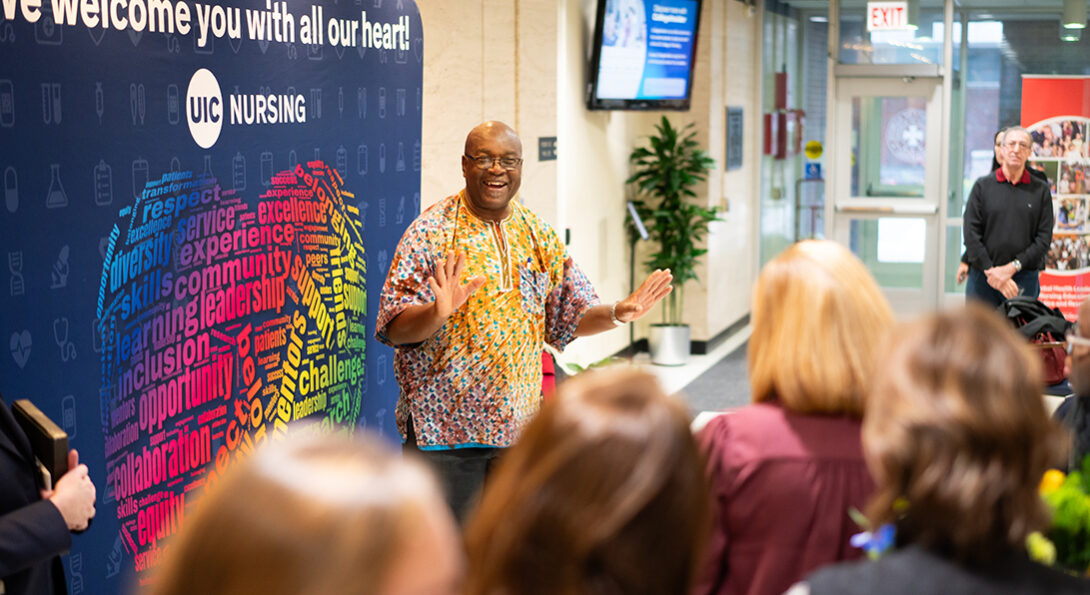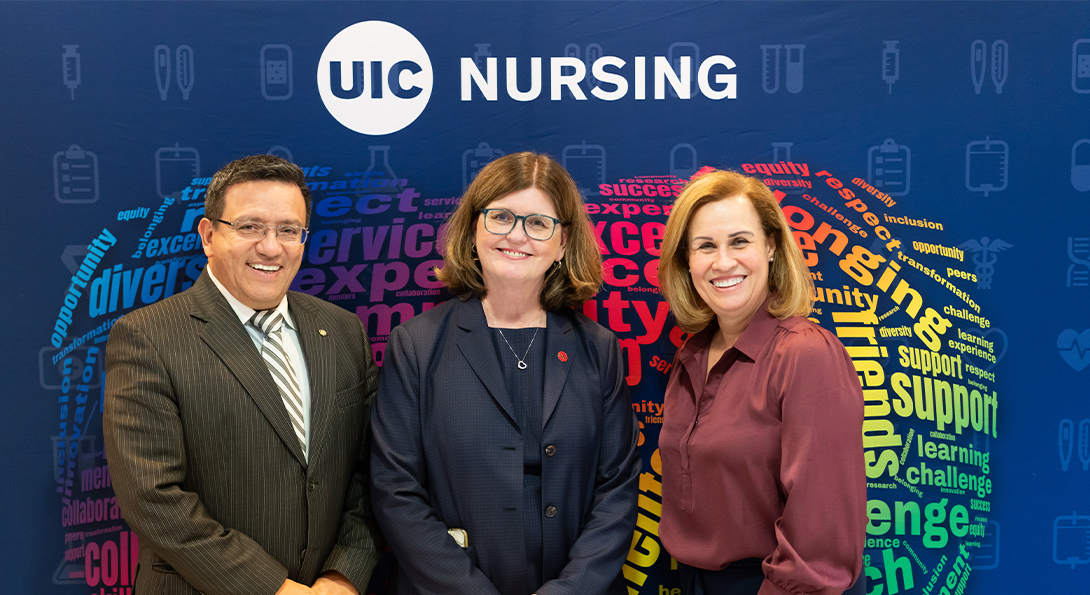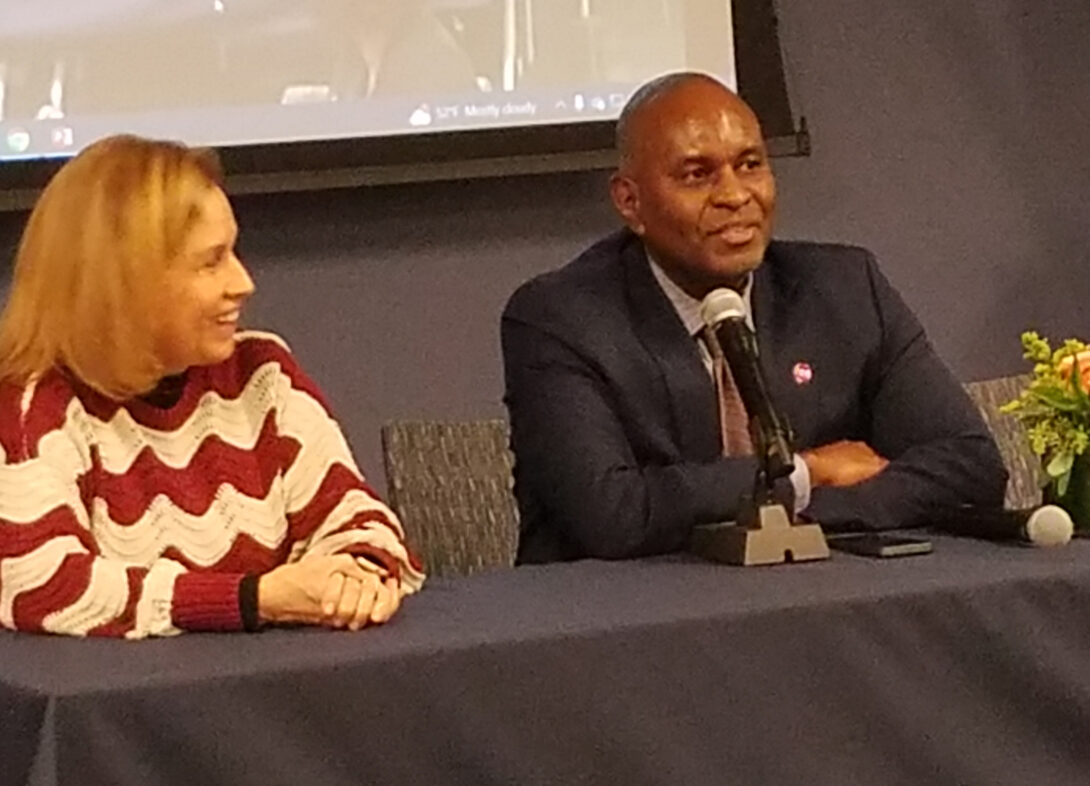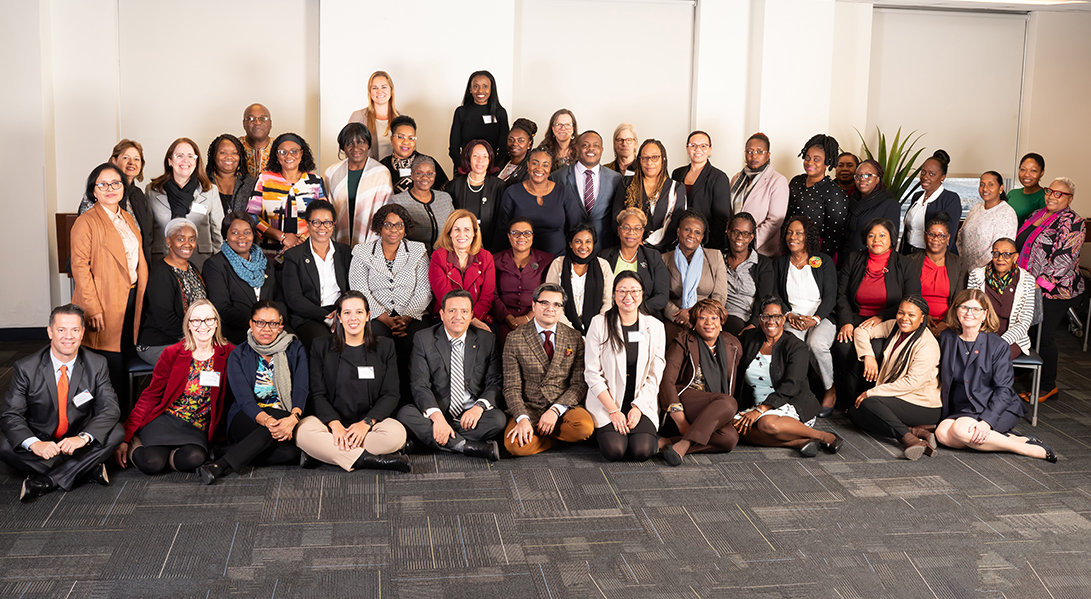College leaders reflect on experience co-hosting Caribbean nursing conference

UIC Nursing became first U.S. Nursing and Midwifery Collaborating Centre in 1986
If you were on the Chicago campus of UIC Nursing in early November, you might have noticed a gathering of more than 50 nurse leaders and health care professionals from across the Caribbean region and representatives from the Pan American Health Organization (PAHO)/World Health Organization (WHO) Collaborating Centres.
The two-day workshop, “Expanding Roles, Education and Regulation of Caribbean Nurses in Primary Health Care,” was held Nov. 1 and 2 at UIC Nursing because of the college’s designation as the PAHO/WHO Collaborating Centre for International Nursing Development in Primary Health Care.
UIC Nursing Dean Eileen Collins, PhD, RN, FAAN, ATSF, and clinical professor Susan Walsh, DNP ’14, MS ’00, BSN ’80, CPNP-PC, FAAN, co-directors of the Centre, as well as Rohan Jeremiah, PhD, MPH, associate dean for global health, sat down to talk about the workshop.
Why was UIC Nursing chosen to co-host this meeting with PAHO?
Susan Walsh: We were the first Nursing and Midwifery Collaborating Centre in the U.S. [when we were first designated in 1986], so we have a really rich history of facilitating these meetings. Co-hosting this meeting, to me, felt like such a privilege.
Eileen Collins: In addition, this particular conference was explicitly focused on strengthening nursing’s contributions in Primary Health Care (PHC) throughout the Caribbean. Because of our Collaborating Centre designation focuses on the development of nursing and Primary Health Care, Dr. Silvia Cassiani, the PAHO regional advisor for nursing, strongly advocated for this meeting in Chicago.
Walsh: Dr. Cassiani had been a visiting scholar at UIC Nursing and felt tied to UIC. We facilitated the launch of her career, which has focused on strengthening nurse leadership through the Region of the Americas.
Rohan Jeremiah: In addition to Dr. Cassiani, this conference featured Dr. Benjamin Puertas [unit chief, Human Resources for Health at PAHO], who graduated from UIC’s School of Public Health.
body copy 2

Who attended the workshop?
Walsh: There were 34 participants from CARICOM, an organization of 15 Caribbean nations. It’s a big plus for us that the Caribbean has this organization, and almost all of them came to the conference.
There were also 24 representatives from 13 PAHO/WHO Collaborating Centres [one in Brazil, two in the Caribbean, and 10 in the U.S.], plus six PAHO/WHO representatives.
Jeremiah: Most CARICOM participants were high-level nursing representatives, if not the most senior public health nurse in the country. We were so honored to host these prominent nurse leaders of the Caribbean.
What were some of the major topics of discussion at the workshop?
Collins: One of the things I was struck by … was the problem of countries of privilege, like the U.S. and the U.K., poaching [Caribbean] nurses. It’s a huge problem. [Caribbean nations] train nurses, and then they’re left with extreme shortages because we actively recruit and incentivize their nurses to migrate.
Walsh: They spent a lot of time talking about the perils of migration. It was uncomfortable being called out, but the flip side of feeling uncomfortable is that, as a U.S. Collaborating Centre, we have Terms of Reference [objectives that UIC Nursing has agreed to work toward as a Collaborating Centre] that strengthen nursing in those countries. One way we do this is through education, at the RN level and at the APRN level, so that nurses have more autonomy.
Our current Terms of Reference focus on building nursing capacity, building leadership, and building strength for education in the Caribbean.
Jeremiah: Both CARICOM and PAHO recognize the need to expand and strengthen advanced practice nursing in the region. One of the contributing factors to the nurse migration crisis is the lack of opportunities to grow into leadership roles. The medical [physician-led] model is still dominant, so nurses aren’t respected in the ways they are in the U.S. They did speak to capacity-building around this, where countries could offer nurses more leadership roles. For example, St. Vincent and the Grenadines is the only Caribbean country that has codified nurses’ capacity to write prescriptions. Other countries have tried to make this happen for many years, and little progress has been made.
Tell me more about how UIC Nursing’s role as a Collaborating Centre will help issues in the Caribbean?
Collins: In collaboration with PAHO, the participating Collaborating Centres have agreed to some “next steps,” such as: helping review regional RN curricula to make sure it’s in alignment with the Primary Health Care approach, developing midwifery curricula, strengthening research capacity, and promoting doctoral education. We’re trying to improve education to make nurses’ roles more satisfying in their home countries, so they don’t have to leave to meet their needs.
Jeremiah: Since the 1980s, PAHO has facilitated efforts to improve nursing education in the region. While each country has the prerogative to develop its curriculum, conference discussions focused on establishing greater synergy for the regional nursing certification exam. There has long been a strong emphasis on streamlining curriculum to be more regionally consistent so that if a nurse is trained and certified in one country, they may seek employment to practice across the region. This workshop aimed to mitigate such nursing professional inconsistencies in order to improve retention of Caribbean nurses.
body copy 3

Do schools in the region currently have degree programs for APRNs?
Jeremiah: There are a few, but these programs are relatively new, having been established within the last five to 10 years. The future of the University of the West Indies Schools of Nursing is contingent on producing teaching and clinical faculty members who can train the next generation of nurses enrolled in their programs.
Walsh: APRNs are part of the solution to increase access to health care. Each country doesn’t have capacity for a full blown APRN program, so my anticipation is there may be joint relationships in academia. One positive is the technology now. Capacity-building will be somewhat technology driven, with classes online via Zoom.
Our college is looking forward to supporting and collaborating with Caribbean countries as they develop APRN programs and solidify working relations with their physician partners.
What are the next steps?
Jeremiah: We have a document that speaks to the next steps of our agreements. [In addition to the things Dean Collins mentioned regarding education], we’re working to improve the data collection on migration and retention, identify working conditions that impact retention, and set up forums to discuss interprofessional education, collaboration, and regulation.
Walsh: That was one of the wonderful benefits of being together in Chicago. Everybody got a chance to meet each other. Now we have sub-groups that meet and collaborate, rather than doing work in an isolated way. I’d never been a meeting like this before. The level of passion, cooperation and collaboration was unprecedented for me.
Why do you think it’s important that UIC Nursing be involved in global initiatives like this one?
Jeremiah: We used this opportunity to improve our recruitment and visibility in the Caribbean. We appealed to conference participants who value internationalism and are looking at getting advanced degrees. We showcased our UIC Nursing facilities as a study destination, or if they wish to collaborate with our faculty members to access our resources and expertise. Our goal is to try to support the advancement of the nursing profession in the Caribbean.
Collins: I also think we have an obligation as leaders in nursing education to share our expertise. We have such a wealth of knowledge and talent in this college. If we can share resources to advance nursing education in parts of the world that need it, we should.
The full assembly of participants

Floor seating: Eileen Collins (front row, far right) and Susan Walsh (front row, second from left) with the extended group of conference participants